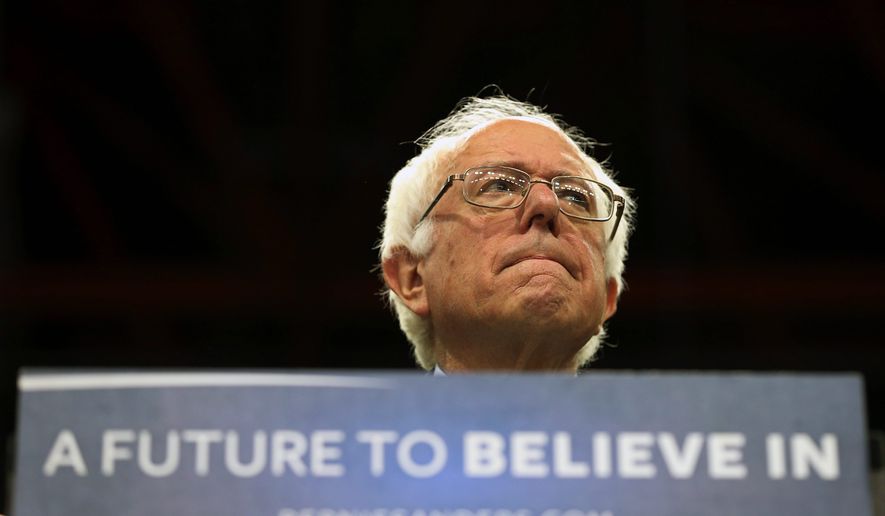Sen. Bernard Sanders has been virtually shut out by leading American newspapers as the media lines up en masse behind Hillary Clinton, showering the former first lady with glowing endorsements while decrying her opponent’s proposals as unrealistic at best.
With more than 50 newspaper endorsements, Mrs. Clinton is far ahead of Mr. Sanders, who has fewer than 12 of his own, and even some of those have come from liberal publications such as The Nation magazine or college publications.
But Mrs. Clinton’s impressive showing with newspaper editorial boards means very little in the primary process itself, specialists say, and the fact that an embarrassingly low number of Americans say they trust the media means Mrs. Clinton likely has gained very little, if any, tangible benefit from the parade of endorsements.
“I think they’re a throwback to another era. I don’t think they mean a whole lot these days,” said David Yepsen, director of the Paul Simon Public Policy Institute at Southern Illinois University and a longtime reporter and editor at The Des Moines Register. “That said, I think newspaper endorsements reinforce a voter’s biases. If I like Hillary and a paper endorses her, that reaffirms my point. If I hate Hillary and they dislike her, then I agree with that. There’s a reinforcement function there . But it’s pretty rare I’ve seen them move an election.”
Indeed, it seems voters put little faith in the media generally, making it unlikely a specific paper’s endorsement would drive voters one way or the other. Just 6 percent of Americans say they have a great deal of confidence in the press, according to a survey released Monday by The Associated Press-NORC Center for Public Affairs Research and the American Press Institute.
For Mr. Sanders, the lack of endorsements only fuels his campaign narrative. He frequently lashes out against the media, casting top press outlets as part of the “establishment” — a broad category into which he also tosses Mrs. Clinton on a daily basis.
Top newspapers argue they’re making their decision based solely on matters of public policy. Virtually all of the editorial boards that have come out in favor of Mrs. Clinton justify their endorsements by arguing she simply has a better grasp of issues, both domestic and foreign, than does Mr. Sanders.
They also say Mr. Sanders’ platform — which includes universal health care, free college tuition and other liberal wish list items — can’t be implemented.
“Beyond the cost of Mr. Sanders’ ideas are his prospects for achieving them. We’ve witnessed how Republicans in Congress have spent seven years trying to thwart President Barack Obama’s more modest agenda,” the Albany Times Union editorial board wrote in its endorsement of Mrs. Clinton over the weekend. “And first he has to get elected. Mr. Sanders’ democratic socialist ideology will make him hard to sell — and easy to misrepresent and attack — in the general election. Mrs. Clinton takes a more moderate, centrist approach while still espousing progressive values.”
The Times Union is just one of the latest newspapers to come out in favor of Mrs. Clinton. The Philadelphia Inquirer, Providence Journal, Hartford Courant, New York Observer and others also have offered endorsements over the past week.
In New York alone, where Democrats will go to the polls for Tuesday’s crucial primary, Mrs. Clinton has at least eight newspaper endorsements, including those from the New York Daily News and New York Times. She holds a 12 percentage point lead in the Real Clear Politics average of New York polls.
“Many of those editorial writers and those publishers know her personally. They’ve covered her over the years. That makes a difference,” Mr. Yepsen said, referring to Mrs. Clinton’s eight years as a senator from New York.
Beyond the Empire State, other major national newspapers such as the St. Louis Post-Dispatch, the Cincinnati Enquirer, the Miami Herald, The Boston Globe and the Chicago Sun-Times also picked the former secretary of state.
Mr. Sanders, on the other hand, has far fewer endorsements to his credit. The two most notable editorial board nods came from The Seattle Times and the leading progressive magazine The Nation. He was also endorsed by the Quad-City Times in Davenport, Iowa, the Greenfield, Massachusetts-based newspaper The Recorder, Ohio’s Athens News and several others.
On the campaign trail Mrs. Clinton’s speeches typically sound similar to the words of the editorial boards backing her, and she often casts herself as a pragmatic changemaker.
“It is easy to diagnose the problems facing America. We need solutions that we work together to achieve,” she said. “I want you to know that, for me, this election is not just about me. It’s about an agenda that we present to New York tomorrow, that we present to the country, that we vote on, because that will give us a chance to actually make the progress we all want to see.”
Mr. Sanders soundly rejects the narrative put forth by both Mrs. Clinton and top U.S. newspapers.
“Let me tell you something, sisters and brothers: there is nothing we have said in this campaign that is pie-in-the-sky, that is utopian. Nothing,” he said in an email to supporters Monday. “The energy, intelligence and idealism of Americans, especially young Americans, have been the greatest agents for change in this country for generations. Those qualities have also powered our campaign from the start, and it’s also what is going to help us take this country back from the billionaire class when we’re elected in November.”
• Ben Wolfgang can be reached at bwolfgang@washingtontimes.com.




Please read our comment policy before commenting.